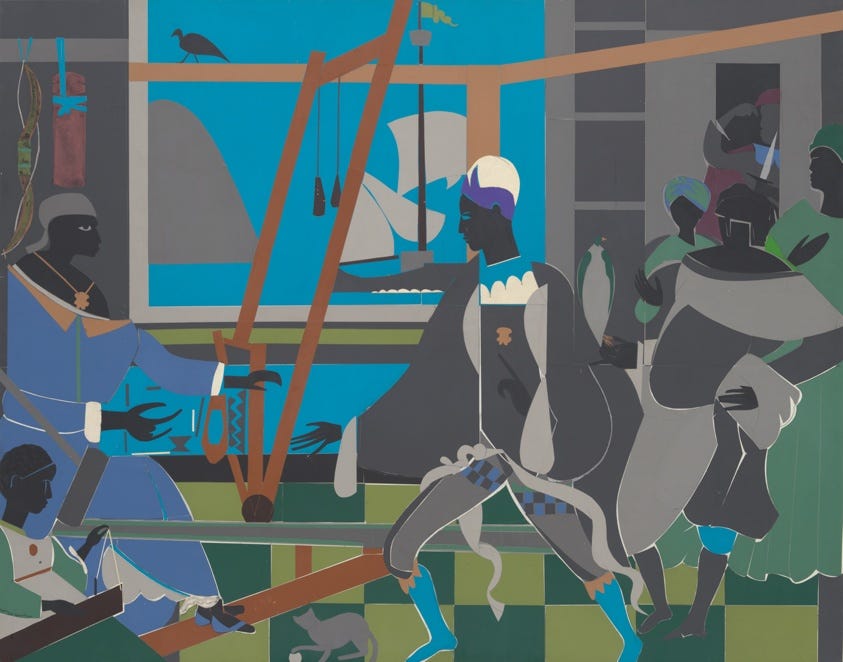Elvis, Homer, and Jimmy Carter
On re-reading Homer's Odyssey
Does anyone else find their mind is given to twists & turns, weaving circuitous routes of free association, wandering like a drunken sailor (or cursed Greek hero) from a news article to a song to an epic poem?
A recent example, retracing the steps of my lurching consciousness:
In the days after Rosalyn Carter’s death, I am reading accounts of her and Jimmy’s lifelong love. I am weeping, imagining the unimaginable: the loss of my own beloved who has journeyed with me since I was a boy. In daytime reveries, I am picturing how bereft I would feel, projecting this onto Jimmy Carter.
This triggers memories of Johnny Cash and June Carter who, it seemed, couldn’t live apart. Johnny lived only a few months after June died in May 2003. This devotion was memorialized in Heidi Newfield’s song, “Johnny & June”–a song you’ve almost certainly never heard of; but I can sing every single word. “And when you’re gone, I wanna go, too / like Johnny and June.”
Being a sentimental romantic, my mind is spiraling and my memory is offering up other cultural artifacts of heartbroken devotion. Before long, I’ve followed the YouTube rabbit trail to Elvis’s sad, poignant live performance of “Unchained Melody,” just months before his tragic death. It’s the performance where the drugs are slurring his speech and ravaging his bloated body but at the piano, the pathos and yearning are once again heard in that singular voice. You can see Elvis in there; you can hear Elvis again. And, romantic that I am, I imagine a vision of Priscilla before him, pulling this performance out of the recesses of his soul.
I hit “replay” over and over again. I can’t get enough of this. I imagine Jimmy Carter singing this to his beloved waiting for him in mansions above.
And then, on maybe the third or fourth listen, the lyrics hit me at a strange angle:
Woah, my love, my darling
I've hungered for your touch
A long, lonely time
And time goes by so slowly
And time can do so much
Are you still mine?
I need your love
I need your love
God speed your love to me
And from out of nowhere (well, somewhere, some recess of my memory), I think to myself: This is a song Odysseus could have sung.
Where did that come from? It’s been years since I’ve read Homer’s Odyssey. This is arriving from the fog of some distant memory (buoyed, since then, by some of my favorite books by Daniel Mendelsohn like An Odyssey and Three Rings1).
And so I decide to re-read Homer’s Odyssey, this time in the Fagles translation.
I am rapt. Enthralled. The pace and energy of Fagles translation is absorbing. I can’t put it down. I read the whole thing.2
We are a long way from news of Rosalyn Carter’s funeral. Like Odysseus, my consciousness is polytropos, a thing of “twists and turns.” My imagination has been on its own circuitous, unpredictable journey. But, at the end of the Odyssey, it returns to where it began. In Book 23, the reunion of Penelope & Odysseus evokes the intimacy of Rosalyn & Jimmy. Penelope shares with Telemachus what every longstanding couple knows:
we two have secret signs,
known to us both but hidden from the world (23.124-125)
Wait for me, wait for me. And when I come home, let us revel in each others stories (23.342). Like Johnny & June. Like Jimmy & Rosalyn. Like Odysseus & Penelope.
I reviewed Mendelsohn’s Three Rings for LitHub.
Too much to be said about the Odyssey to even dare to begin here. I’ll note just one thing: on this re-reading (let’s call it my middle-aged revisitation) I am struck by how many defeats and failures Odysseus has yet to endure after the triumphs of Troy. A life of stellar accomplishment is not a guaranteed trajectory. We don’t just keep winning. This banal point is no doubt obvious to most readers, but somehow came home to me afresh this time around.


